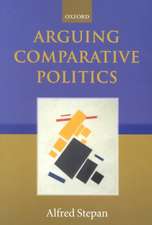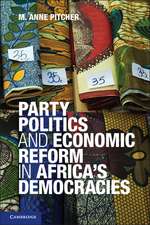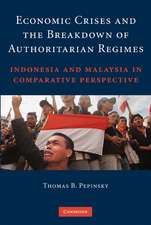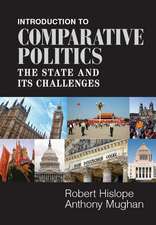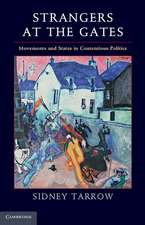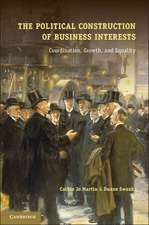Urban Protest in Mexico and Brazil
Autor Kathleen Bruhnen Limba Engleză Hardback – 2 mar 2008
Preț: 463.48 lei
Nou
Puncte Express: 695
Preț estimativ în valută:
88.70€ • 92.26$ • 73.23£
88.70€ • 92.26$ • 73.23£
Carte tipărită la comandă
Livrare economică 15-29 aprilie
Preluare comenzi: 021 569.72.76
Specificații
ISBN-13: 9780521881296
ISBN-10: 0521881293
Pagini: 224
Ilustrații: 15 tables
Dimensiuni: 158 x 234 x 18 mm
Greutate: 0.45 kg
Ediția:New.
Editura: Cambridge University Press
Colecția Cambridge University Press
Locul publicării:New York, United States
ISBN-10: 0521881293
Pagini: 224
Ilustrații: 15 tables
Dimensiuni: 158 x 234 x 18 mm
Greutate: 0.45 kg
Ediția:New.
Editura: Cambridge University Press
Colecția Cambridge University Press
Locul publicării:New York, United States
Cuprins
1. Riding the tiger: urban protest and political parties; 2. Setting the stage: research design, case selection, and methods; 3. The limits of loyalty; 4. A union born out of struggles: the union of municipal public servants of Sao Paulo (SINDSEP); 5. Partisan loyalty and corporatist control: the unified union of workers of the government of the federal district (SUTGDF); 6. Clients or citizens? Neighborhood associations in Mexico City; 7. Favelas and corticos: neighborhood organizing in Sao Paulo; 8. The dynamics of protest.
Recenzii
“Kathleen Bruhn, whose earlier work on the Mexican left remains the definitive analysis of the Democratic Revolutionary Party, adds to her initial scholarly reputation with a fascinating, detailed, original exploration of protest movements in Mexico City and São Paulo, based on a unique, author-generated, extensive data-base from newspaper archives. Bruhn masterfully combines a rigorous comparative framework and empirical analysis with qualitative insights and assessments drawn from years of field research, noting the importance of such variables as organizational culture, resources, political context, and party alliances in explaining differences in protest behavior. Urban Protest in Mexico and Brazil establishes a notable benchmark for understanding the nature and impact of social movements in the region.”
Roderick Camp, Claremont McKenna College
“Kathleen Bruhn is a first rate scholar and the work presented in this volume is excellent and very innovative. There are some fascinating stories to be told about this material, and Bruhn’s exhaustive fieldwork concentrates on areas which deserve scholarly attention. Her book is based on a fantastic data set which she uses with statistical sophistication without sacrificing the user-friendliness of the text.”
Miguel Centeno, Princeton University
“Most movement scholarship is movement ‘centric’ in its ignorance of other parties to contention, and biased toward the study of reform movements in Western democracies. That is what makes Bruhn’s book such a welcome change. Not only does her comparative study of movements in Brazil and Mexico shed light on the dynamics of contention in an important and understudied regime context, but in focusing her analysis on the dynamic relationships between states, parties and movements, the author offers a model for the way movements ought to be studied. This book deserves to find a broad audience in sociology and political science.”
Doug McAdam, Stanford University
Roderick Camp, Claremont McKenna College
“Kathleen Bruhn is a first rate scholar and the work presented in this volume is excellent and very innovative. There are some fascinating stories to be told about this material, and Bruhn’s exhaustive fieldwork concentrates on areas which deserve scholarly attention. Her book is based on a fantastic data set which she uses with statistical sophistication without sacrificing the user-friendliness of the text.”
Miguel Centeno, Princeton University
“Most movement scholarship is movement ‘centric’ in its ignorance of other parties to contention, and biased toward the study of reform movements in Western democracies. That is what makes Bruhn’s book such a welcome change. Not only does her comparative study of movements in Brazil and Mexico shed light on the dynamics of contention in an important and understudied regime context, but in focusing her analysis on the dynamic relationships between states, parties and movements, the author offers a model for the way movements ought to be studied. This book deserves to find a broad audience in sociology and political science.”
Doug McAdam, Stanford University
Notă biografică
Descriere
Analyzes how protest became a key part of organizational maintenance and how organizations use protest as a political tool.


